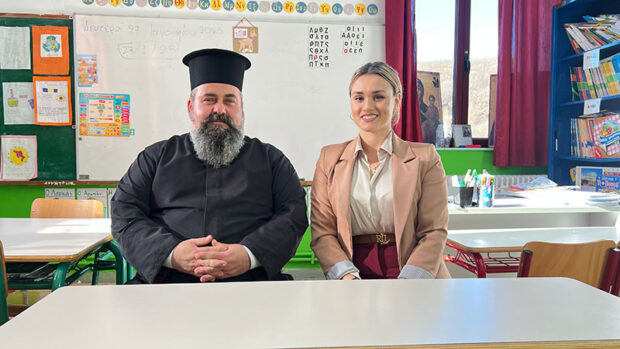Reviving Fourna: How a Facebook Appeal Brought New Life to a Greek Village
People who decided to move there speak to NEO
By Kelly Fanarioti
The decreased number of births, an aging population, and the concentration of residents in large urban centers are among the key challenges Greece has faced in recent years. As a result, schools in mountainous regions and remote islands are closing due to the lack of children, with the remaining residents mostly being elderly. A striking example is the village of Fourna in the prefecture of Evritania, where the kindergarten remained closed for the first time this year, and the primary school has only two pupils—one of whom will graduate this summer. In an effort to attract new families with children, the village’s teacher and priest launched a Facebook appeal in August, offering free housing for a year, financial support, and job search assistance to two couples.

Fr. Konstantinos and the village’s teacher Giota Diamanti
The post gained significant attention, with more than 1,000 people expressing interest in moving to the mountainous village in central Greece within just a few days. “We made the post in mid-August, and even now, two and a half months later, we are still receiving calls from families. Many people are looking for a better quality of life for their children and a lower cost of living, which is exorbitant in big cities,” says village teacher Yanna Diamanti.
Two families have now settled in the village—one with six children and the other with three—leading to a fourfold increase in the number of primary school pupils. As a result, the kindergarten is expected to reopen next year to accommodate the needs of the new families. “If these families hadn’t come, the village primary school would have been left with just one pupil next year and would have eventually closed. We selected families who best fit the village’s profile and who wouldn’t have difficulty finding work here,” the teacher explains.

Thirty-six-year-old Vasiliki, a mother of six, has been living in Fourna with her family since September 7. “There is kindness, care, and solidarity among the residents—something that is hard to find in big cities. For example, a neighbor might go to collect eggs and then knock on my door to offer me some too. These small acts create a sense of security and unity,” she says.
Her husband will work at the local timber cooperative and take on other manual jobs, while the 36-year-old mother plans to open a bakery—something the village has been without for 25 years. As for their children, they are embracing the village’s quality of life. “A few days ago, my eldest son, who is 14, said to me, ‘Mum, I am finally alive.’ In the afternoons, they play ball with the other village children, explore the area, or go chestnut picking. In Athens, these opportunities didn’t exist—after school, they would just spend hours on their mobile phones,” she explains.

In the coming days, another family is set to move to the village—that of Dimitris Tasoulas, nephew of the President of Greece Konstantinos Tasoulas. Speaking to NEO, he explained that he and his wife made the decision to relocate so their three children could have a better quality of life. Currently working in a catering business in Athens, he plans to shift to agrotourism once they settle in Fourna.
“This move will completely change our lives, but I’m certain it will be for the better. Life in Athens is stressful, with constant pressure,” he says.
Referring to his uncle, who was sworn in as President of the Republic just a few days ago, Dimitris Tasoulas suggested that he should lead a program to provide financial support for families looking to move to the country’s villages.

“Many villages are at risk of being wiped off the map, as soon there will be no residents left. The state must take action. There are jobs in the villages, but no residents to fill them,” he says.
When asked if the lack of a doctor in the village makes him nervous, Dimitris Tasoulas answered no. “I live in Kolonos. If something happens to one of the children and I need to go to the Children’s Hospital, it takes at least 40 minutes without traffic. With traffic, it takes over an hour. Karpenisi Hospital is just 30 minutes from Fourna, so no, it doesn’t stress me out,” he stresses emphatically.

“New Life in the Village”
The overwhelming interest sparked by the teacher’s post led to the creation of the Non-Governmental Organization (NGO) “New Life in the Village”. Its goal is to raise funds to help the village welcome and support more families.
“In addition to those wanting to move here, businesses and individuals have also stepped forward to contribute to Fourna’s revitalization. It’s incredibly moving, and I believe that in the near future, we will be able to welcome more families who are waiting,” the teacher says.
The success of this initiative has also inspired residents from other deserted villages across Greece to seek advice on how to attract new inhabitants. Meanwhile, a research team from France recently visited Fourna to explore ways to develop the village’s mountainous landscape.
“When the priest and I decided last summer to make the post in hopes of saving the school and bringing Fourna back to life, we never expected such a response. German media have already visited us to cover what happened and speak with the families who settled here, and in a few days, we are expecting journalists from New York Times. I hope this marks the beginning of a true renaissance for our village,” concludes Giota Diamanti.















0 comments